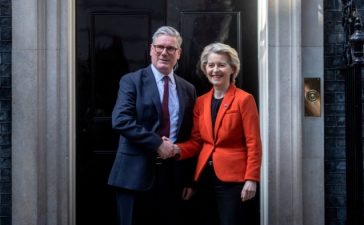The federal judge presiding over Donald Trump’s criminal prosecution for interference in the 2020 election issued a series of deadlines on Thursday that will see prosecutors have the last word just days before the November election on whether the charges should be kept against the former president.
In a brief order, the US district judge Tanya Chutkan decided that prosecutors could file the first brief explaining how the charges against Trump in a slimmed-down indictment complied with the US supreme court’s ruling granting former presidents broad immunity from prosecution.
That means prosecutors – over the Trump team’s objections – will also have the final word on why they believe all of the conduct in the superseding indictment is not covered by immunity in a filing that is due on 29 October, just one week before the presidential election in November.
The order resolved a nagging issue for the Trump campaign ever since the supreme court returned the case to Chutkan in the weeks after it issued its ruling: how much of the damaging criminal case could be a factor in the final sprint to election day.
As it currently stands, Trump will have to grapple with two major filings where the special counsel, Jack Smith, plans to argue that all of Trump’s efforts to overturn the previous election, including on January 6, involved unofficial conduct that Trump executed in his capacity as a candidate.
But Trump will get an opportunity to file his own response, and there will be no time for evidentiary hearings that could prove damaging to the Trump campaign politically where prosecutors could call witnesses who could give testimony to the judge.
The scheduling order came after an hours-long hearing in federal district court in Washington DC, where Chutkan declared she would not let Trump’s presidential campaign or the election affect how and when the case should proceed.
She said at the hearing in federal district court that she viewed proposals from the Trump team, which is trying to get the case dismissed, as a way to limit anything that could be politically damaging from emerging with fewer than 70 days until election day on 5 November.
“It strikes me that what you’re trying to do is affect the presentation of evidence in this case in a way so as not to impinge on the election of the president,” Chutkan told the lead Trump lawyer, John Lauro.
At issue in the case now is how to apply the supreme court’s far-reaching decision to grant immunity to former presidents.
The supreme court devised three categories of conduct: core presidential functions that carry absolute immunity, official acts within the outer perimeter of the presidency that carry presumptive immunity, and unofficial acts that carry no immunity.
Prosecutors in the office of the special counsel, Jack Smith, told Chutkan at the hearing that they wanted to deviate from regular sequencing and file a brief outlining why the superseding indictment contained only unofficial conduct for which Trump could be charged.
With Smith looking on, the lead trial prosecutor, Thomas Windom, told Chutkan they should go first, because their brief could act like a companion guide to the indictment and outline why the revised charges should be kept.
after newsletter promotion
The Trump legal team told the judge that allowing prosecutors to go first and start the immunity review process immediately would be “incredibly unfair” to Trump at this “sensitive time”, in a reference to the presidential race.
Instead, Lauro argued, the Trump team should go first and file a motion to dismiss the indictment on the basis that it was buttressed by Trump’s conversations with Mike Pence, which the supreme court ruled were presumptively immune.
“If your honor decides, and your honor may very well decide that the information relating to Vice-President Pence is not only presumptively immune, but immune, then that indictment has to be dismissed,” Lauro said.
But Chutkan immediately seized on the “sensitive time” remark, and sharply responded that she would not allow politics to decide the schedule.
“I said before, and I say again, that the electoral process, timing of the election and what needs to happen before shouldn’t happen for election, is not relevant here. This court is not concerned with the electoral schedule,” Chutkan said.
“Yes, there’s an election coming, but the sensitive time that you’re talking about, if you’re talking about the timing of legal issues and the timing of evidentiary issues in relation to when the election is … that’s nothing I’m going to consider.”
Trump has been enormously successful in delaying his criminal cases, which came as part of a broader strategy to push his legal troubles past November, in the hopes that he wins and can appoint a loyalist as the attorney general who would then drop the cases entirely.










